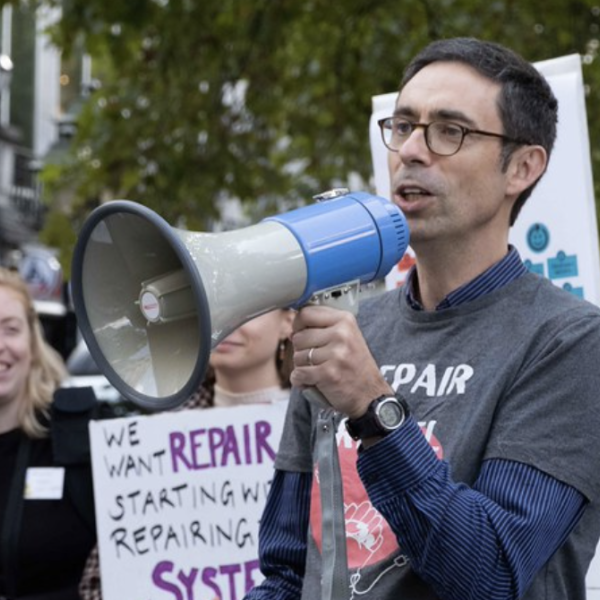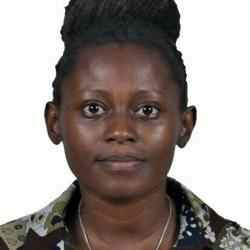Introduction
Ugo is the connector and convener of a new European movement on electronic repair rights. He activates the community to create a culture of repairing electronics, raise awareness on the importance of repair, and to gather strategic data on reparability issues. He fosters relationships with key actors working at a policy level, advocating for repair strategies based on the accurate data he collected. Ugo's venture has expanded rapidly and is being replicated internationally, successfully creating a constantly evolving movement to shift our relationship to technology.
The New Idea
Ugo's insight to create a repair movement based on an open data collection system helped him and his partners define the electronic repair market in Europe and its value chain. Ugo's vision of shifting the economy from a recycling mentality to a repairability and reuse mentality has its strength in educating people to prefer to repair their own products.
In 2013, Ugo Vallauri launched his organization The Restart Project, with the mission to transform European policies for the reuse and repair of electronics and electric products. Ugo built a strong awareness on the importance of repair by creating a community ecosystem model for repair enthusiasts that everyone can access, which has been replicated in many countries. This community called “Restart Community” is made by in-person events or Restart Parties where volunteers help and teach how to repair broken or slow devices, as well as the European largest online platform for repair volunteers and activists (Restarters.net) with over 650 active groups in 25 countries.
Since 2017, Ugo has created and coordinates the International Repair Day, a global celebration on the importance of repairs that takes place on the third Saturday of each October. Through extensive collaborations, Ugo’s work on the right to repair can already be seen across a range of European countries. Ugo has become the connector and convener of a new European movement of electronic repair called Right to Repair Campaign, a coalition of 110 organizations from 23 countries across the EU. The main objective of the campaign is to put everyone in control of the repairability of their products by requiring manufacturers to provide affordable spare parts and by creating a European Repairability Index to enable all consumers to make informed choices.
To make the e-waste problem visible at a European policy level, Ugo leads an open data strategy through the Open Repair Alliance – composed of over 100 organizations from across Europe – to influence EU policymakers in establishing new regulations against e-waste, planned obsolescence, and promoting repair as an avenue to better work and environmental justice. Ugo provides data collection in an open format for all Alliance partners, enabling them to gain leverage to pursue changes to public policy. Together they have measured more than 81,000 repaired and recycled items. With his scientific approach, he designed the Fixometer app allowing each repair party to have the same data collection method, helping in building a repair knowledge base and logging fixes occurring at the events, capturing the environmental and social impact of their work. According to Ugo’s research, on 500 products, 36% were still working, 9% needed minor repairs and 25% were not fully tested. By repairing and reusing products, up to 50% of these devices can be diverted from the recycling and waste systems.
Ugo’s vision is to ensure that electrical products can be reused as much as possible, both in their entirety and in their individual components. This is extremely important, considering that only a third of electronic products are properly recycled. In fact, the components of e-waste are complex to deal with and, in many cases, they are toxic. There is also an invisible systemic problem associated with managing e-waste, namely the massive problem of illegal processing and dumping. For this reason, Ugo is focused on reuse first.
The Problem
The throwaway economy is strongly supported by the consumerist logic of electronics companies and not by people who would like to see repair at a more affordable cost. In fact, according to a Eurobarometer survey, 77% of EU consumers would like manufacturers to make products more repairable1.
E-waste is the fastest-growing waste stream in the world. A record of 53.6 million metric tons (Mt) of electronic waste was generated worldwide in 2019, up 21% in just five years, according to the UN’s Global E-waste Monitor 2020. The report also predicted global e-waste would reach 74 Mt by 2030, almost doubling the amount of e-waste in just 16 years. Higher consumption of electric equipment with short life cycles and few options for repair mean that e-waste is the world’s fastest-growing domestic waste stream. Only 17.4 per cent of 2019’s global e-waste was collected and recycled. This means that gold, silver, copper, platinum and other high-value, recoverable materials conservatively valued at US $57 billion were mostly dumped or burned rather than being collected for treatment and reuse.
In Europe, although the situation is less severe (according to the latest E-waste Monitor 2022, Europe produced 12 Mt of e-waste and collected and recycled 42% of products in environmentally sound ways), recycling is not always the best solution for electronic waste. Incentivizing producers to recycle by setting targets and penalties for not meeting targets does not stimulate corporate accountability toward good recycling practices, as corporations only comply to avoid the penalty and not because they understand a possible benefit. Some companies have even assimilated the penalties costs for not recycling into their product pricing. Additionally, most of the environmental impact occurs during the manufacturing phase because companies have to continue to extract materials, a toxic activity for workers, with the mining industry having a large environmental impact overall.
Electronics manufacturing corporations in Europe have been increasingly challenged by citizens and regulated by governments to consider and reduce their ecological footprint, but the electronic market is very competitive and with very large corporations in it. Companies tend to introduce several new products with just minor upgrades on features, such as the camera performance in smartphones, a major factor linked to overproduction in the electronic field.. The UK consumer rights organization2 has reported extensively about short software support cycles, contributing to making products obsolete. There is no incentive for the second market and the warranties regulations have high costs for the consumers, offering no options for consumers to repair the electronics after the warranty expires. Electronic products are simply not designed for repair, making planned obsolescence a major issue for EU policy bodies.
The Strategy
Ugo created The Restart Project because he truly believes he can continue to fuel a growing movement that counteracts the throwaway economy. The Restart Project is an organization solidly grounded in hands-on work in the communities and Ugo plays a connector role between all the partners involved in the Right to Repair movement.
The strategy is tri-partite, recognizing that the grassroots work needs campaigning, policy, and public awareness work. Each strategic outcome is virtuously entangled with the others and cannot stand alone. First, there is the Community repair ecosystem he created to produce the first step of a mindset shift and the awareness on importance of repair. Restart Parties – free repair events where volunteer fixers help and teach others how to repair broken or slow devices – have been hosted all around Europe. Local organized groups then leverage Restart Parties to activate their ecosystems and nowadays engage over 650 volunteers’ groups. In this sense, Ugo has created one of the largest databases of people who can repair electronic objects. He has expanded the Community ecosystem internationally, through the FixFest, a global gathering of the repair movement, which began in 2017. The latest event was in Brussels in 2022 with The Restart Project designing and leading the agenda, theme, and key sessions. During the first FixFest, Ugo also created and coordinated the International Repair Day, a global celebration of the importance of repairs, featuring community repair groups, repair professionals, companies supporting repair, municipalities, universities, and others. It now takes place on the third Saturday of each October, and by 2022 included over 400 events globally.
The second pillar of the strategy is the open data platform called Restarters.net, the international platform for repair volunteers and activists. Their activities are recorded with the app Fixometer to build a repair knowledge base and log fixes occurring at the events they run, capturing the environmental and social impact of their work. Restart Project has also worked extensively in the UK to produce crowdsourcing mapping tools; for example, there is one for reliable repair businesses that is considered an integral part of community and vision, and another for UK laptop donation to those that need them the most such as refugees, school children, and job seekers. The idea of keeping the platform open source was to allow it to serve the Open Repair Alliance, the international group of over 100 community repair organizations committed to influence European policy makers to promote electrical and electronic repair regulation. The Open Repair Alliance was created in 2017 to convince all the repair events to share their practices and has since produced over 100,000 records of repair attempts, main repair problem categories, how many people were involved, and how many products were repaired. The work that Ugo pioneered, on collecting and publishing open data about community repair, allows hundreds of individuals and organizations to perform their own data analysis. He routinely uses data insights to contribute to policy consultations with the European Commission on repair policies. Analytics of data downloads show that policymakers alongside businesses, researchers, academics and more, download the data to learn more about barriers and opportunities highlighted by the growing dataset from community groups around the world. Insights help reveal the popularity of specific types of repairs in specific countries – for example, confirming that coffee machines are very popular in Northern Europe. The European Right to Repair campaign has successfully used this open dataset to influence repairability policy for smartphones and tablets which will come into effect in the EU in 2025.
The third part of the strategy is the European Policy Movement that Ugo leads, the European Right to Repair Campaign, together with a strong steering committee and a coalition of 110 organizations from 23 countries in Europe, made of environmental NGOs, providers of spare parts, manufacturing companies like FairPhone and repair networks. The main goal of the Campaign is to define the right to repair and ensure everyone has control over the repairability of their products. They influence EU policymakers in establishing new regulations against e-waste and planned obsolescence, compelling manufacturing companies to provide affordable spare parts and promoting repair as part of their services. The other part is to highlight issues of cost and fairness in relation to repair, combining the voices of communities and professionals, so that all consumers can access a European Reparability index to make conscious decisions about which product they purchase based on reparability capacities. Ugo uses the open data from repair events to influence policy processes and documenting good pro-repair policies in cities and regions and inspiring others to learn from them.
Ugo has also partnered with two think tanks, the European Environmental Bureau (EBB) and the Environmental Coalition on Standards (ECOS), who are both partners of the Right to Repair Campaign. Ugo contributes with the data on Right to Repair strategy related to corporations’ policies. He expects to continue documenting positive effects of repair activities on a country basis to help policymakers find better solutions that address systemic barriers such as monitoring Austria’s voucher scheme to remove the repair costs for consumers, or in another European country to removing the VAT tax if the company offers a repair service. Ugo is also working to create a more permanent presence at a local level like physical hubs for repair enthusiasts, helping to transform a volunteer passion into a job opportunity for many and especially for young people. He continues to work with the aim of shifting the economy from a recycling mentality to reparability and reuse.
The Person
Ugo was born and brought up in Bra, a rural village outside Turin, where the Slow Food Movement started. He grew up in a creative environment and his family encouraged him a lot.
Ugo's curiosity about technology came in the late ‘80s when, as a teenager, he would help his friends configure their first PCs to play videogames. When the time came to choose his studies, he was very undecided whether to take a tech career or a humanistic career. He then graduated in Communication fascinated about how people interact with new technologies. This became more obvious as he began working with farmers in Kenya, building a network of farming communities within the Slow Food movement. His interest in empowering people with access to communication technologies led him to embrace the world of international cooperation, becoming a research officer in Nairobi for Computer Aid International, one of the most important non-profit organizations in London on equal access to technology.
From 2004 to 2010 he worked with many realities in the sub-Saharan Africa countries. While living as an expat in Kenya, Ugo created a blog and met many Kenyan entrepreneurs, such as Ephraim Ngali, who helped him repair a pair of headphones that would be destined to waste in Europe. He interviewed him about his work for the blog and as Ugo used to say, the big inspiration moment for having the idea of Restart Project came in that moment when Ugo opened his eyes to the unbridled consumerism in the Global North versus the Global South approach to appreciate and make their belongings last as long as possible through maintenance, upgrading and repair.
In 2011 he met Janet, his co-founder and one year later they started with the first repair session done by four volunteer "repair heroes" in North London. It was a huge success and the word spread rapidly. Ugo felt it was an idea with potential and in 2013 started the adventure with The Restart Project.



